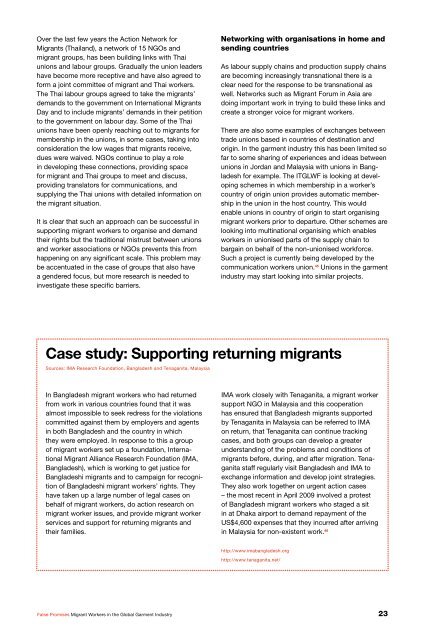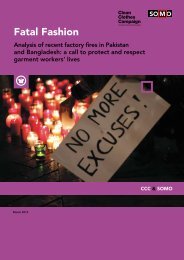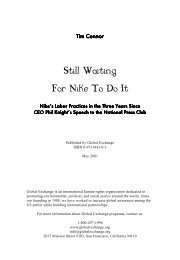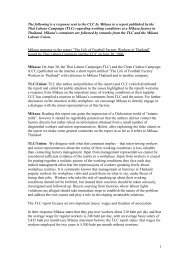Create successful ePaper yourself
Turn your PDF publications into a flip-book with our unique Google optimized e-Paper software.
Over the last few years the Action Network for<br />
Migrants (Thailand), a network of 15 NGOs and<br />
migrant groups, has been building links with Thai<br />
unions and labour groups. Gradually the union leaders<br />
have become more receptive and have also agreed to<br />
form a joint committee of migrant and Thai workers.<br />
The Thai labour groups agreed to take the migrants’<br />
demands to the government on International Migrants<br />
Day and to include migrants’ demands in their petition<br />
to the government on labour day. Some of the Thai<br />
unions have been openly reaching out to migrants for<br />
membership in the unions, in some cases, taking into<br />
consideration the low wages that migrants receive,<br />
dues were waived. NGOs continue to play a role<br />
in developing these connections, providing space<br />
for migrant and Thai groups to meet and discuss,<br />
providing translators for communications, and<br />
supplying the Thai unions with detailed information on<br />
the migrant situation.<br />
It is clear that such an approach can be successful in<br />
supporting migrant workers to organise and demand<br />
their rights but the traditional mistrust between unions<br />
and worker associations or NGOs prevents this from<br />
happening on any significant scale. This problem may<br />
be accentuated in the case of groups that also have<br />
a gendered focus, but more research is needed to<br />
investigate these specific barriers.<br />
False Promises Migrant Workers in the Global Garment Industry<br />
Networking with organisations in home and<br />
sending countries<br />
As labour supply chains and production supply chains<br />
are becoming increasingly transnational there is a<br />
clear need for the response to be transnational as<br />
well. Networks such as Migrant Forum in Asia are<br />
doing important work in trying to build these links and<br />
create a stronger voice for migrant workers.<br />
There are also some examples of exchanges between<br />
trade unions based in countries of destination and<br />
origin. In the garment industry this has been limited so<br />
far to some sharing of experiences and ideas between<br />
unions in Jordan and Malaysia with unions in Bangladesh<br />
for example. The ITGLWF is looking at developing<br />
schemes in which membership in a worker’s<br />
country of origin union provides automatic membership<br />
in the union in the host country. This would<br />
enable unions in country of origin to start organising<br />
migrant workers prior to departure. Other schemes are<br />
looking into multinational organising which enables<br />
workers in unionised parts of the supply chain to<br />
bargain on behalf of the non-unionised workforce.<br />
Such a project is currently being developed by the<br />
communication workers union. 45 Unions in the garment<br />
industry may start looking into similar projects.<br />
Case study: Supporting returning migrants<br />
Sources: IMA Research Foundation, Bangladesh and Tenaganita, Malaysia<br />
In Bangladesh migrant workers who had returned<br />
from work in various countries found that it was<br />
almost impossible to seek redress for the violations<br />
committed against them by employers and agents<br />
in both Bangladesh and the country in which<br />
they were employed. In response to this a group<br />
of migrant workers set up a foundation, International<br />
Migrant Alliance Research Foundation (IMA,<br />
Bangladesh), which is working to get justice for<br />
Bangladeshi migrants and to campaign for recognition<br />
of Bangladeshi migrant workers’ rights. They<br />
have taken up a large number of legal cases on<br />
behalf of migrant workers, do action research on<br />
migrant worker issues, and provide migrant worker<br />
services and support for returning migrants and<br />
their families.<br />
IMA work closely with Tenaganita, a migrant worker<br />
support NGO in Malaysia and this cooperation<br />
has ensured that Bangladesh migrants supported<br />
by Tenaganita in Malaysia can be referred to IMA<br />
on return, that Tenaganita can continue tracking<br />
cases, and both groups can develop a greater<br />
understanding of the problems and conditions of<br />
migrants before, during, and after migration. Tenaganita<br />
staff regularly visit Bangladesh and IMA to<br />
exchange information and develop joint strategies.<br />
They also work together on urgent action cases<br />
– the most recent in April 2009 involved a protest<br />
of Bangladesh migrant workers who staged a sit<br />
in at Dhaka airport to demand repayment of the<br />
US$4,600 expenses that they incurred after arriving<br />
in Malaysia for non-existent work. 46<br />
http://www.imabangladesh.org<br />
http://www.tenaganita.net/<br />
23





